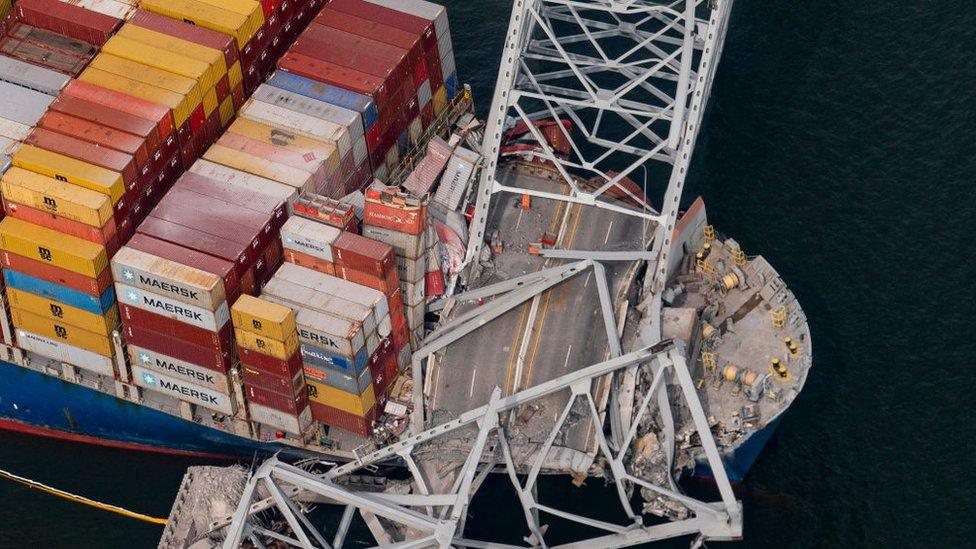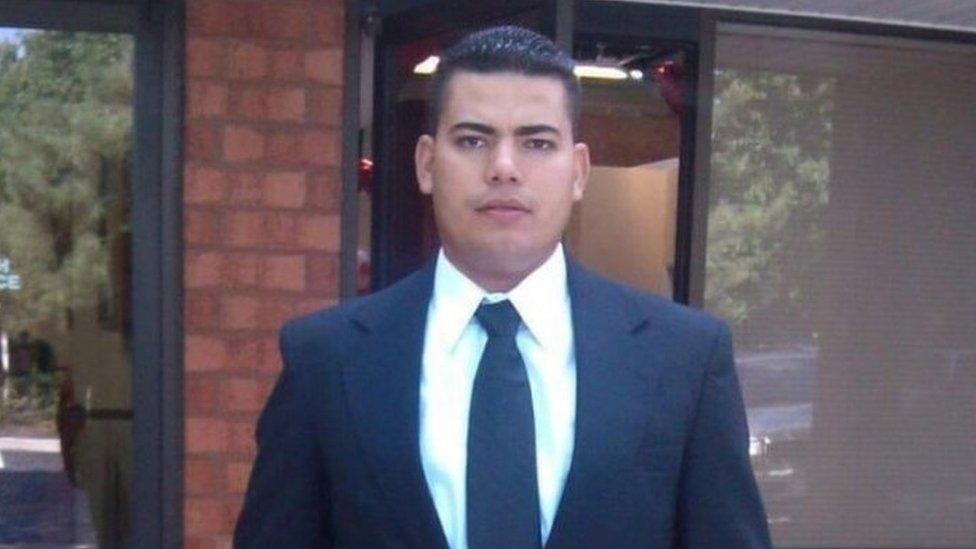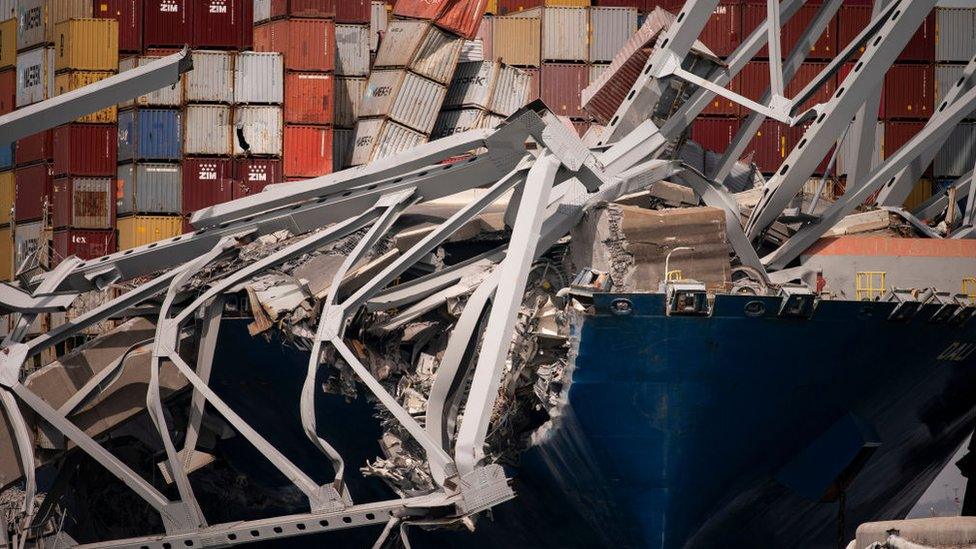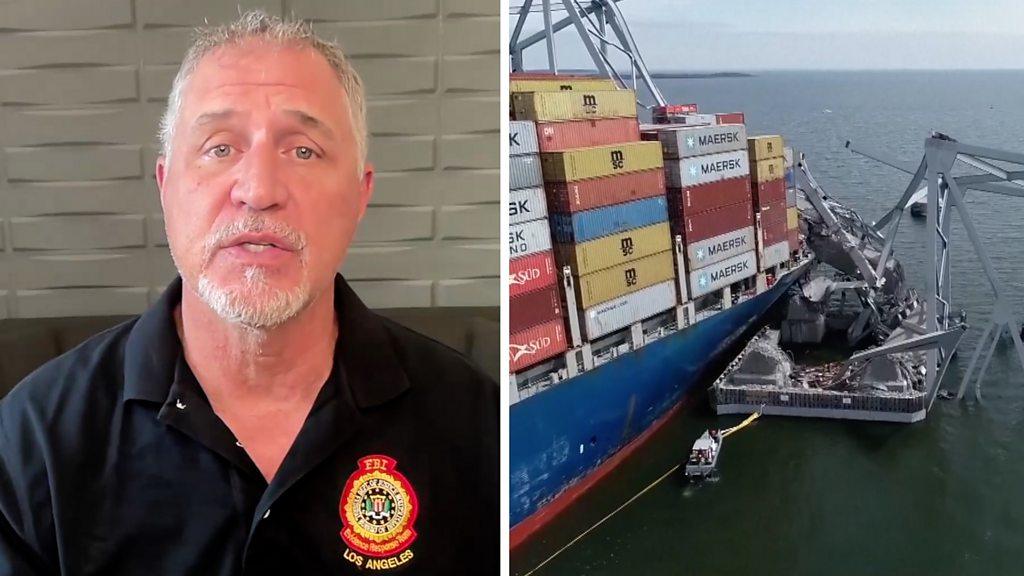Baltimore bridge collapse: Governor details plan to remove bridge and help affected
- Published
Watch: Governor outlines obstacles to remove Baltimore bridge
Maryland's governor has provided early details of his plan to clean up wreckage after a cargo ship hit a major bridge Baltimore, killing six.
The Biden administration has approved $60m (£47m) in emergency funds that Maryland had requested to help.
Governor Wes Moore outlined how they intended to clear debris, remove the ship, extract bridge pieces and rebuild it.
"We have a very long road ahead of us," he said.
Eight construction workers were on the bridge when it partially collapsed. Two of them were rescued from the water.
Speaking alongside lawmakers at a news conference on Thursday, Mr Moore outlined plans for each stage of the process, which he said will pose several challenges.
The cargo vessel, the Dali, that hit the Francis Scott Key Bridge is nearly as long as the Eiffel Tower, he said.
He contrasted the situation to the 2021 incident in which it took five weeks to remove a cargo ship that became stuck in the Suez Canal. The difference here, the governor said, is that the Key Bridge is on top of the vessel.
"We're talking 3,000 to 4,000 tons of steel that's sitting on that ship," Mr Moore said.

Maryland Governor Wes Moore said it was an unprecedented challenge
He added that the rivers' waters were dark, and the debris in the water so dense that divers could not see more than one or two feet in front of them.
"So most of the operation, they simply feel," he said. "These divers have been methodical, they've been disciplined, they've been courageous, diving in darkness with objects all around them."
The state has requested a host of resources to help with the clean-up process.
The US Army Corps of Engineers is covering the cost of clearing the channel and has 32 staff members and 38 US Navy contractors on the ground, said Maryland's Democratic Senator Chris Van Hollen.
He added that a 1,000-ton (907-tonne) crane - the largest on the US eastern seaboard - would arrive around 0:00 EST (04:00 GMT) on Friday to help remove debris. A 400-ton crane would then come on Saturday to further aid in clearing the debris.
In the meantime, those involved in the clean-up process must figure out how to cut debris from the bridge into pieces so they can be lifted by the crane, said Rear Admiral Shannon Gilreath of the US Coast Guard.
Authorities have also deployed 2,400 feet of water containment booms to protect against hazardous material from the boat, Mr Moore said.
The Dali was carrying thousands of cargo containers on board, including 56 that were holding hazardous materials, officials have said. That included items like lithium batteries and perfume, according to the governor.
Speaking to reporters on Wednesday, Jennifer Homendy, chair of the National Transportation Safety Board, said 764 tonnes of mostly corrosive and flammable materials were identified on the boat.
Mr Moore said the state is also planning to provide economic support to workers whose jobs have been affected by the crash - around 8,000 people, according to the state government.
The recovery cost will not be cheap, according to analysts, but the state is eligible for more federal emergency relief funds in addition to the $60m it has already received, Mr Van Hollen said.
He said that money would help cover the "lion's share of reconstructing the bridge".
Mr Van Hollen said he would introduce legislation to cover the remainder of the recovery costs. President Joe Biden has previously said the federal government should foot the bill to rebuild the bridge.
During Thursday's news conference, Mr Moore and others stressed the importance of fixing the structure as soon as possible.
Its long-term closure could pose a threat to global supply chains, experts have said.
"That's our number one priority, is to reopen the port of Baltimore as fast as we can - and safely," Mr Gilreath said.
Related topics
- Published7 May 2024

- Published28 March 2024

- Published27 March 2024
